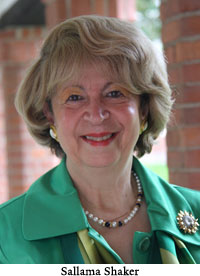Editor’s note: The following article was written by Sallama Shaker, visiting professor of Islamic studies at Yale Divinity School, program chair of the AMSS conference. Shaker offered special thanks to Abdul-Aziz Said of American University, John Esposito of Georgetown University, and Layla Sein of AMSS for “their relentless efforts that contributed to the success of the conference.
On Sept. 29, Yale Divinity School hosted the 41st Association of Muslim Social Scientists of North America (AMSS) Annual Conference, which focused discussions on the subject ”Religious Dimensions of Democratization Processes in Muslim-majority Nations.” The conference was cosponsored by Yale Divinity School and the Council on Middle East Studies of the MacMillan Center at Yale University
 In welcoming participants to campus, YDS Dean Gregory E. Sterling emphasized the need to build bridges between Yale Divinity School and the Muslim world, noting that such activities are very much in keeping with the school’s emphasis on expanding its global reach. Program Chair Sallama Shaker, visiting professor of Islamic Studies and former Egyptian ambassador to Canada, highlighted the importance of constructive dialogue as a way to overcome Islamophobia. She also pointed to the importance of analyzing the recent uprisings in Arab countries in the context of the peoples’ aspirations to achieve social justice and freedom.
In welcoming participants to campus, YDS Dean Gregory E. Sterling emphasized the need to build bridges between Yale Divinity School and the Muslim world, noting that such activities are very much in keeping with the school’s emphasis on expanding its global reach. Program Chair Sallama Shaker, visiting professor of Islamic Studies and former Egyptian ambassador to Canada, highlighted the importance of constructive dialogue as a way to overcome Islamophobia. She also pointed to the importance of analyzing the recent uprisings in Arab countries in the context of the peoples’ aspirations to achieve social justice and freedom.
During the first of four panel presentations, which addressed the Arab Spring, former AMSS President Ali Mazrui of Binghampton University discussed the challenges facing democracy in many of the Arab societies while sharing the experience of South Africa in developing its constitution. His presentation, which explored whether the overthrow of dictators has led to democratization, was titled, ” The Arab Spring and Democratization in Sub-Saharan Africa: Which is cause and which is effect?”
Thomas Uthup, also from Binghamton University, argued that a sustainable Arab Spring will depend upon the location of liberal values in Islam, and Ermin Sinanovic from the U.S. Naval Academy explored how the Arab Spring has contributed to and influenced contemporary Islamic political thought.
The second panel focused on ”religion, politics and economics in the Arab spring. Nebil Husayn from Princeton University discussed the case of Bahrain and the challenges that country faces, particularly the ideological, political, and economic methods and motives that encourage hardliners in the monarchy to maintain authoritarianism. A second panelist, Meriem El Haitami, a doctoral student at the University of Sidi Mohammed Ben Abdelah in Fez, Morocco, addressed the interaction between gender and Islam and presented a paper that explored how the deployment of state-trained female religious authorities has helped endorse the authority of the state and curb voices of individuals or groups that operate outside of official Islam. The third panelist, Nabil Mikhail of George Washington University, explored the role of Cairo’s Al-Azhar University and the Coptic church in post-Mubarak Egypt.
The keynote speaker of the conference was Juan Cole of the University of Michigan, who addressed the Arab spring and democracy in the context of the several questions: What social and political forces drove the upheavals in the Arab world in 2011? What are the achievements so far? What accounts for their success and failures?
Cole argued that Arab youth felt economically, socially, and politically blocked from participating because of nepotism and cronyism. He emphasized that the main accomplishment of the revolts in the Arab world has been the end of what he termed “republican dynasticism.”
The third panel, ”Moving Beyond the Arab Spring—Challenges to Democracy, Identity, Social Justice and Freedom in the Arab World” featured panelists Mubarak Awad from American University and Yale Divinity School student Christian Watkins. Awad addressed the challenges to democracy and justice in the Arab world, concluding that the Arab Spring is a warning and an inspiration for new generations to free themselves from the repression, corruption and social injustice of the kind experienced by their parents. Watkins discussed political Islam and the Egyptian awakening—re-imagining political identity, media narratives and the future of Democracy.
The fourth panel included Celene Ayat Lizzio from Brandeis University, Sumaiya Hamdani of George Mason University, and Shenila Khoja-Moolji of Columbia University. Lizzio addressed gender issues and personal status law in the MENA region encompassing the Middle East and North Africa and showed how disparate notions of women’s empowerment at play in public debates construct radically different priorities for women’s social engagement within and beyond the domestic sphere. Hamdani spoke on political Islam and historical precedents for minority and majority relations. Khoja- Moolji addressed gender issues in Pakistan and the notion of empowerment, exploring the notion that investment in women and girls can help address issues related to poverty and human rights.
Also participating and contributing to the success of the conference were Yale University scholars Jonathan Wyrtzen , Youssef Casewit, Joseph Cumming, and Frank Griffel. Coordinating the event were Sallama Shaker of Yale and Layla Sein, director of academic affairs for AMSS.
| Attachment | Size |
|---|---|
| 3.41 KB |